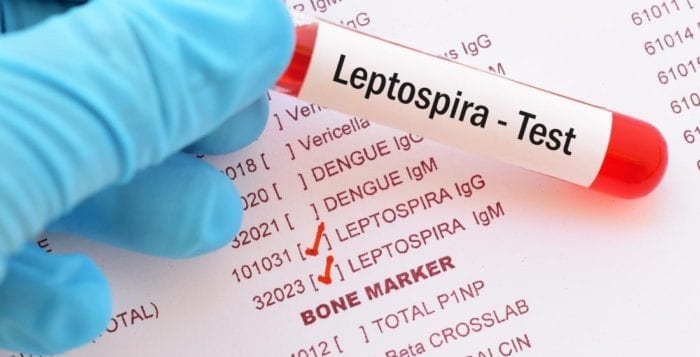By Matthew Kearns, DVM

When I review vaccines with a pet owner, I usually get a nod of recognition on all vaccines until I mention leptospirosis. Then their face kind of squishes up in a weird sort of way.
Leptospirosis is a disease caused by an S-shaped bacteria called Leptospira. The bacteria affects dogs, humans, raccoons, possums, rats and squirrels. Outbreaks occur during a wet period after a prolonged dry spell (the type of weather we see from mid-August to mid-October).
Leptospirosis bacteria are passed in the urine of infected animals. Therefore dogs do not have to come in direct contact with the wildlife. The most common way the bacteria is passed is from drinking “standing water.” Standing water refers to stagnant creeks, puddles, etc. Once the Leptospira bacteria is in the mouth, the bacteria passes through the membranes of the mouth into the bloodstream. It then travels via the bloodstream throughout the body. Depending on the strain that the pet is exposed to the bacteria can do damage to the liver, kidneys or both.
Symptoms of infection include lethargy, inappetance, increased thirst and urination, and sometimes vomiting. Initial blood work will show elevations in liver enzymes, kidney enzymes or both. Definitive testing takes at least 10 days to get results. Therefore, better to treat while waiting on test results than to wait.
The good news is this is a bacterial infection and will respond to antibiotics. If leptospirosis is diagnosed or suspected by your veterinarian, they will place your dog on antibiotics and other medications. Dogs that are too ill to take antibiotics will need to be admitted for IV fluids and medications initially. Dogs still eating and not vomiting can be sent home on oral medications. The bad news is (especially with the kidneys) the damage is sometimes already done by the time your dog presents to your veterinarian with illness.
There is no way to eradicate this bacteria from the environment, but there is a vaccine available from your veterinarian that is effective against the most important strains seen on Long Island. The protection provided by the vaccine is short lived so annual boosters are a must. Make sure to keep your yard clear of puddles and other standing water (if possible), as well as keep dogs clear of wild animals or where wild animals have been.
This infection is zoonotic. Zoonotic refers to diseases that can be passed from animals to humans. If exposed, most people only get flu-like symptoms (fever, muscle aches, etc.), but the bacteria can affect the liver, kidneys and central nervous system. At-risk groups are the very young, very old and those with compromised immune systems (whether it be from disease or medications).
If your dog has been diagnosed, take special care in handling them or their bedding. Wear gloves, wash bedding with bleach, and leash walk in areas that can either be decontaminated with dilute bleach (a 1:40 dilution or one teaspoon of bleach to every gallon of water) or away from where other dogs and humans play. Wash hands after handling them and if you are feeling ill please see your own physician immediately.
If you think your dog may be at risk for leptospirosis talk to your veterinarian about instituting the leptospirosis vaccine into your dog’s annual protocol.
Dr. Kearns practices veterinary medicine from his Port Jefferson office and is pictured with his son Matthew and his dog Jasmine. Have a question for the vet? Email it to [email protected] to see his answer in an upcoming column.





